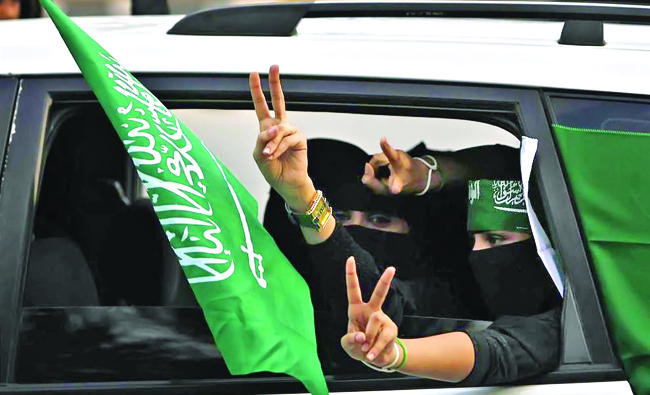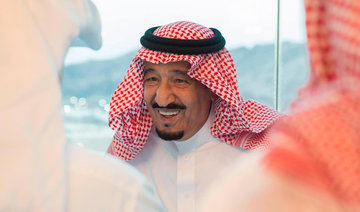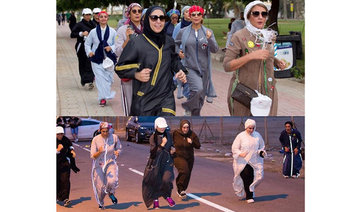JEDDAH: The US on Tuesday led an international welcome for Saudi Arabia’s decision to allow women to drive.
The historic move, ordered in a decree by King Salman, will see women get behind the wheel from June next year.
“We’re happy to hear that,” said US State Department spokeswoman Heather Nauert.
“It’s a great step in the right direction. We’re just happy today. A very positive sign,” she said.
The decree, issued on the state-run Saudi Press Agency, said women in Saudi Arabia would be able to obtain driving licenses and drive cars.
News of the decision became the top trending topic on Twitter, with many posts tagged #SaudiWomenCanDrive.
The decree referred to the “negative effects of not allowing women to drive vehicles, and the positive effects envisaged from allowing them to do so” within the context of Islamic law.
The decree also pointed to the fact that the majority of the Council of Senior Scholars agreed that women driving was not prohibited by religion, and therefore they did not oppose allowing them to drive in principle.
“The scholars see no reason not to allow women to drive as long as there are legal and regulatory guarantees to avoid the pretexts (that those against women driving had in mind), even if they are unlikely to happen,” said the decree.
The king instructed the Interior Ministry to apply traffic regulations, including the issuance of driving licenses, equally to both men and women.
The move was announced on television and also by the Saudi Ministry of Foreign Affairs, with the royal decree mandating the creation of a high-level committee of ministries (including the Interior Ministry, Finance Ministry and the Labor and Social Development Ministry) to study the necessary steps needed to implement the regulations.
“The committee must submit its recommendations within 30 days. The implementation — God willing — will be from Shawwal 10, 1439 (corresponding to June 24, 2018) and in accordance with rules and regulations, and the completion of the necessary steps,” said the decree.
In Washington, Saudi Ambassador Prince Khaled bin Salman described the decision as a huge step. “It’s not just a social change, it’s part of economic reform,” he said.
“Our leadership believes this is the right time to do this change because in Saudi we have a young, dynamic open society.”
The reaction within Saudi Arabia was swift and emotional.
“I am on top of the world,” Lina Almaeena, a Shoura Council member, told Arab News from Bern, Switzerland, where she is part of the official Shoura Council delegation to Switzerland.
“This historic decision and announcement is really going to make a difference in many, if not most, Saudi families. Economically, it is going to decrease the burden on families; socially it will be much better for women to have control over their lives, not always waiting for a man who is no relation to her; or being in a car alone with a stranger whose background she is not aware of.”
Almaeena said the decree allowing women to drive was part of Crown Prince Mohammed bin Salman’s Saudi Vision 2030. It was about women’s empowerment and equal opportunities for men and women, whether in the work force or anywhere else, she said.
“These things are all connected. Women can drive and even if they are not working, they can drive their families to work or their children to school. Fathers are not always available.”
Almaeena said there was a general expectation that Saudi women would be allowed to drive. “But were we expecting this decision tonight? No, this has come as a very pleasant surprise,” she said, thanking King Salman and Crown Prince Mohammed bin Salman.
Samia Al-Amoudi, a prominent businesswoman and breast cancer survivor in Jeddah, told Arab News: “The idea of women’s empowerment would have remained incomplete without allowing women to drive.
“I am happy that women are allowed to drive and that my daughter will be allowed to drive. This is a great day for Saudi Arabia.”
Italy’s Consul General Elisabetta Martini also welcomed the decision. “We want to congratulate all Saudi women on this opportunity given to them by the king. We wish them safe driving,” she told Arab News.
Amena Bakr, a Saudi energy analyst, said it was a “massive victory for women in the Kingdom.”
“Really about time,” she said.
The issue of women driving has been the subject of debate in Saudi Arabia for many years.
“The Kingdom’s leadership has determined — correctly — that the time has come for it to be resolved,” said Fahad Nazer, international fellow at the Washington-based National Council on US-Arab Relations.
“There is wide support for the decision among both Saudi women and men. The issue was never about religion or culture. It has always been about the readiness of Saudi society. It is a very important step in the right direction.”
‘A very positive sign’: congratulations pour in as Saudi women are finally allowed to drive
‘A very positive sign’: congratulations pour in as Saudi women are finally allowed to drive

Syrian Arab Republic president meets with Saudi crown prince in Riyadh

- The president is accompanied by the country’s foreign minister, Asaad Hassan Al-Shibani
DUBAI: The president of the Syrian Arab Republic, Ahmed Al-Sharaa, met with Saudi Arabia’s Crown Prince Mohammed bin Salman on Sunday on his first foreign trip since taking office, local media reported.
Syrian Arab News Agency reported the president was accompanied by the country’s foreign minister, Asaad Hassan Al-Shaibani.
Al-Sharaa will meet Saudi Crown Prince Mohammed bin Salman in Riyadh, SANA reported.
A picture posted on social media platform X by the Syrian Arab Republic’s presidency showed Al-Sharaa and Al-Shaibani en route to Saudi Arabia.
President al-#Sharaa in the 1st official visit to #KSAhttps://t.co/wu17EyxVDC pic.twitter.com/NtUfsr7v0f
— SANAEnglishOfficial (@SANAEnOfficial) February 2, 2025
Al-Sharaa became president after the toppling of the regime of Bashar Assad in December last year.
Last month Saudi Arabia’s foreign minister, Prince Faisal bin Farhan, visited Damascus and said the Kingdom was engaged in talks with the US and European partners to help lift economic sanctions imposed on the Syrian Arab Republic that have left the country’s economy decimated.
Tihama’s climate boosts honey production in Baha

RIYADH: The moderate climate and abundant flowering trees in the Tihama area of the Baha region attract thousands of beekeepers with hives, creating an ideal environment for honey production from seasonal and mountainous blossoms.
Beekeeper Mohammed Al-Zahrani said that migration from the Sarawat Mountains to Tihama is driven by favorable climate, rainfall, and tree diversity, the Saudi Press Agency reported.
He added that this move revitalizes bees after the ziziphus spina-christi season when their population drops, offering fresh pastures for reproduction.
Beekeeper Ali Al-Ghamdi explained that relocating to the governorates of Qalwa, Al-Hujrah, and Wadi Al-Ahsabah provides bees with a year-round food supply and protection from the cold mountain temperatures that can be fatal.
He stressed that beekeeping requires endurance, knowledge, and experience but remains an important and valuable industry, the SPA reported.
Beekeeper Saleh Al-Omari highlighted the coordination among beekeepers in choosing apiary sites, ensuring proper spacing to prevent crossbreeding, promote nutrition, and avoid disease.
Mohammed Al-Shadwi, chairman of the Beekeepers Cooperative Association in Baha, said around 3,000 beekeepers are registered with the association, including professionals with over 1,000 hives and amateurs with about 100. They represent 16 percent of the Kingdom’s total beekeepers.
The region produces 20 percent of Saudi Arabia’s honey annually, totaling around 1,000 tonnes across 15 varieties, according to the SPA.
Kingdom strengthens cultural ties at Delhi book fair

RIYADH: Saudi Arabia’s Literature, Publishing and Translation Commission is taking part in the New Delhi World Book Fair, being held at Pragati Maidan from Feb. 1-9.
Its involvement is part of ongoing efforts to strengthen cultural cooperation between the Kingdom and India, reported the Saudi Press Agency on Sunday.
The commission aims to highlight Saudi Arabia’s role in the global cultural and literary landscape, raise awareness of its heritage and highlight its publications and contribution to the international literary scene. It also seeks to promote cultural and intellectual exchange between the two countries.
The commission’s pavilion features its literary and cultural initiatives, including “Tarjim” which supports Saudi Arabia’s translation movement. It also hosts sections dedicated to the King Salman Global Academy for the Arabic Language and the King Fahd National Library.
Saudi Arabia was previously guest of honor at the 2024 New Delhi World Book Fair, where it organized various programs and events reflecting the Kingdom’s cultural and creative landscape.
KSrelief’s humanitarian and relief efforts continue

RIYADH: The King Salman Humanitarian Aid and Relief Center’s (KSrelief) humanitarian and relief efforts continue with the distribution of food, hygiene supplies as well as the provision of emergency transport services.
In in Ma’arrat Misrin of Syria’s Idlib Governorate, KSrelief handed out 672 food boxes and 672 hygiene kits as part of the second phase of the food aid and hygiene kit distribution project for populations affected by the earthquake in 2025.
In Lebanon’s Akkar Governorate and Miniyeh district, the aid agency during the past week distributed 175,000 bags of bread to Syrian and Palestinian refugees as well as residents of host communities. The initiative was part of the fourth phase of Al-Amal Charitable Bakery Project in the country.
In the Battagram and Buner districts of Khyber Pakhtunkhwa province, as well as the Sukkur district in Sindh province of Pakistan, 2,160 food packages were given to families in flood-affected areas as part of the Food Security Support Project 2025
Meanwhile, KSrelief delivered 125 tonnes of dates to Sudan as a gift from the Kingdom.
In north Lebanon, the KSrelief-funded ambulance service of Subul Al-Salam Social Association in the Miniyeh district carried out 61 missions during the past week, including transporting patients to and from hospitals and treating burn injuries.
Female participation in Riyadh camel racing event

- The increase in the number of participating women camel riders has also contributed to a rise in the prizes
RIYADH: The number of women taking part in camel racing at the Custodian of the Two Holy Mosques Camel Festival this year has doubled compared to 2024, reported the Saudi Press Agency.
The increase has led the organizing committee to add a second race which includes 18 Saudi female camel riders.
Organized by the Saudi Camel Federation, the festival’s second edition kicked off on Jan. 27 at the Janadriyah Camel Race Track in Riyadh. It will end on Wednesday, Feb. 5 with total prize money of more than SR70 million ($18.7 million) awarded.

During last year’s festival, 15 female camel riders competed, representing Britain, France, Germany, Iran, Jordan, Oman, Saudi Arabia, the UAE and Yemen.
This year has seen 30 female riders from 12 countries take part: Algeria, Bahrain, Britain, France, Germany, Oman, Poland, Saudi Arabia, Switzerland, the UAE, US and Yemen.
The increase has contributed to a rise in the prize pot, with the first-placed female rider receiving SR60,000.























